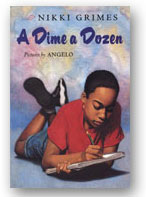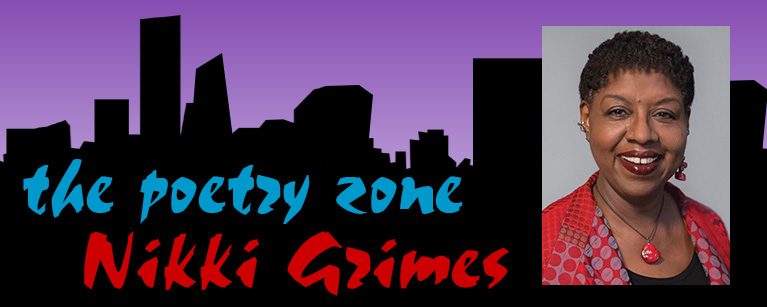Bilingual
 My girlfriend
My girlfriend
Guadalupe knows
she’s not
the only one
who speaks
two tongues.
I’m fluent in
two Englishes:
one “Black”
the other “good.”
It pays to speak
both languages
/in my neighborhood.
—A Dime a Dozen
_______________
This is a touchy subject, so I may as well jump on in.
I was recently asked to read and comment on a book featuring a main character who frequently thinks and speaks in poor English throughout, and I had a problem with it.
I grew up in neighborhoods where children, and many adults for that matter, dropped g’s and split infinitives on a daily basis. And, to be clear, I’m not talking about regional dialects, or colloquialisms. I’m talking about grammatically incorrect English. I heard it used every day. I, myself, was discouraged from using it by my parents, and most especially by my self-taught grandmother, who would drop everything and give me the evil-eye if I so much as used the word “ain’t” in her presence.
Now, I was not taught that I would be better than anyone else if I used “good” English, but I definitely got the message that the use of standard English grammar would stand me in good stead when I went out into the larger world to make my way. Wise advice, as it turned out.
Right or wrong, in mainstream society, particularly in the marketplace, we are judged by the manner in which we communicate. If we routinely use incorrect grammar, (or speak with a thick accent) we are often assumed to be less intelligent or capable than someone who uses good grammar. Mind you, the Standard English speaker may not, in fact, be the smarter of the two. However, doors will be opened for the one, and closed to the other, based solely on the perception of intelligence as judged on the basis of speech patterns. Anyone who has ever been an immigrant, as I once was in Sweden, knows exactly what I’m talking about.
What does all of this have to do with the book I read? I’m getting to that.
Most of the stories I write are set in the kind of inner-city neighborhoods I grew up in. My characters live and breathe in these communities, have the same experiences as people living there, struggle with the same problems, and share the same regional dialects, slang, and colloquialisms. However, you will not hear my characters using poor grammar, and that is not by accident.
For more than 30 years, I have been giving voice to African American children, in general, and urban children of color in particular. I create stories that validate them, respect them, and speak to and through them. And I do so without using heavy dialect or incorrect grammar. Why? While I’m all about validating the person, I don’t want to encourage or validate a speech pattern that will ill serve these children later in life when they leave the neighborhood to work, get a higher education, or apply for a bank loan to start a business. Instead, I try to create a good and valuable model of language use that, I hope, my readers will aspire to; models that language arts teachers and reading coaches can point to as they seek to raise the language bar for their African American students, in particular. And yes, there’s definitely a line, here. I walk it every single time I put pen to paper.
Like many authors, I often choose to use authentic speech in the dialogue I write, but I’ve discovered that a little goes a very long way.
Some people argue that there’s nothing wrong with mimicking the actual speech patterns they hear in a given community since, well, that is the way they speak. But that’s a weak argument. Sure, I’ve heard children say “we ain’t been doing nothing bad,” it’s true. However, there are also those who use four letter words with great abandon, and employ the “f” bomb in every other sentence. Should storytellers, particularly those of us who write for children, mimic that, as well?
As writers of fiction, our job is not to regurgitate everything we see and hear precisely as we see and hear it. We are not reporters, or court stenographers. We are storytellers. As such, we get to make decisions about what our characters say, and how they say it. And those of us who write for children have an added responsibility in the models we create for our young readers. After all, we are reaching them at a time in their lives when they are still malleable. That matters.
There’s another side to this issue, though. Call this the dollars-and-cents side of things. African American children’s authors are already at a disadvantage in the marketplace. We have a tough time getting our books into the mainstream simply by virtue of the fact that our book covers feature black characters. As it is, there are booksellers, teachers, parents, and even librarians who presume that a child who is other than African-American will not relate to a book featuring an African American character. Ask any Black author you know, and he or she will confirm what I say. We, as authors, have to work doubly hard to prove how wrong this assumption is. Given such a climate, is it really wise to create a book written in a manner that will discourage even more teachers from using that book in their classrooms, or keep librarians from sharing it with the students they serve, or dissuade booksellers outside of the black community from putting it on their shelves?
Obviously, the choice of language style is up to the individual author. I’d simply like to stress that there is a great deal to consider when making that choice.



2 Responses
“As writers of fiction, our job is not to regurgitate everything we see and hear precisely as we see and hear it. We are not reporters, or court stenographers. We are storytellers.”
Nikki, I think you raise some provocative questions for contemporary writers that include, but go beyond the issue of language. What does it mean to be a storyteller? What is our ‘code of ethics’? How do we balance engaging with culture with shaping it, and not slide into merely reflecting it? Questions worth wrestling. Thanks.
“However, there are also those who use four letter words with great abandon, and employ the “f” bomb in every other sentence.”
I had just journaled this thought the day before yesterday. While researching urban fiction I came a across a book written by a fellow Bronxite. His characters were all set in the South Bronx; his theme was drug dealing/using and the life that goes with it. I can relate all too well with this lifestyle, though, thankfully, long removed. After reading several chapters one thing struck me: the language–though true to street and character, made the reading cumbersome, borderline fake. The point is, though people really talk like that in the street, there is no need for it in extreme on paper. As you said, “A little goes a very long way.” There are many avenues to explore in this discussion and the pros and cons. But I’ll only hit on one right now. As a reader, I’ve been drawn into stories where authentic language was used creatively and sparingly, making it hard to put the book down. As a writer, I could only wish to do the same.